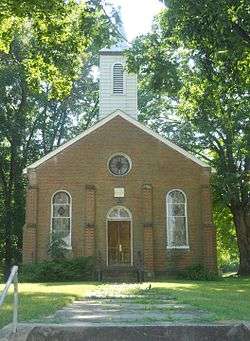Missouri District of the Lutheran Church–Missouri Synod
The Missouri District is one of the 35 districts of the Lutheran Church–Missouri Synod (LCMS), and comprises the state of Missouri. Five Missouri congregations are in the non-geographic English District, and one congregation in St. Louis is in the SELC District. The Missouri District is home to the Synod's headquarters as well as Concordia Seminary, both of which are located in or just outside St. Louis. The district includes approximately 301 congregations and missions, subdivided into 28 circuits, as well as 52 preschools, 56 elementary schools and 9 high schools. Baptized membership in district congregations is approximately 138,000.[1] It is the third largest district of the LCMS in number of congregations (trailing the Michigan and Texas Districts) and second largest in total membership (behind the Michigan District).
Missouri District of the LCMS | |
|---|---|
| Location | |
| Country | United States |
| Territory | Missouri |
| Headquarters | St. Louis |
| Statistics | |
| Congregations | 301 |
| Schools |
|
| Members | 138,000 |
| Information | |
| Denomination | Lutheran Church–Missouri Synod |
| Established | 1966 |
| Current leadership | |
| President | Rev. Dr. Robert Lee Hagan |
| Website | |
| www | |
The Missouri District was formed in 1966 when the Western District was divided, also creating the Mid-South District. District offices are located in St. Louis. Delegates from each congregation meet in convention every three years to elect the district president, four vice presidents, circuit counselors, a board of directors, and other officers. The Rev. Robert Lee Hagan became the district president in 2015. Concordia Lutheran Church of Frohna, Missouri is the oldest congregation in the District, founded in 1839.
Presidents
- Rev. Herman C. Scherer, 1966–78
- Rev. Paul Ph. Spitz, 1978–91
- Rev. James W. Kalthoff, 1991–2006
- Rev. Ray G. Mirly, 2006–2015
- Rev. Robert Lee Hagan, 2015–present
.jpg)
